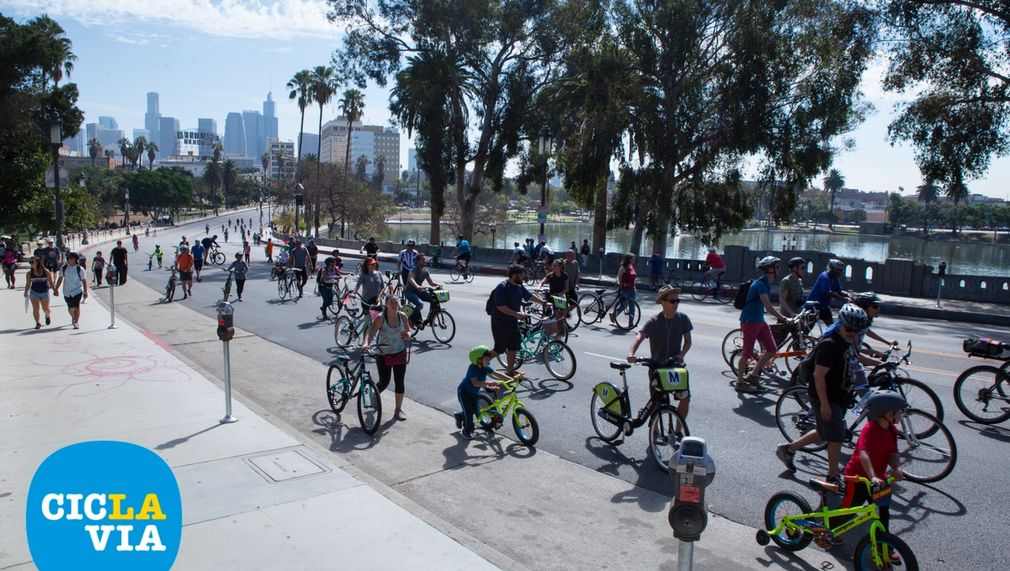Walking and Rolling to Cleaner Air
CicLAvia will use our decade plus of experience temporarily replacing cars with people-powered transit, to ESTIMATE the effects transportation changes can have on air quality, namely the impact of reducing car trips. From there, CicLAvia will leverage our role as a trusted voice in LA to SPARK CHANGE. We will transform the data into engaging messaging to inform key stakeholders and equip everyday Angelenos to advocate for needed policy changes and adjust their personal behavior to make LA the best place to walk and roll our way to cleaner air!

What is the primary issue area that your application will impact?
Climate and Environment
In which areas of Los Angeles will you be directly working?
County of Los Angeles
In what stage of innovation is this project, program, or initiative?
Expand existing project, program, or initiative
What is your understanding of the issue that you are seeking to address?
A 2015 study by the Institute for Transportation & Development Policy found that transportation is the fastest growing source of energy-related CO2 in the world. Worldwide, about 6% of urban trips are taken by bike—a percentage that is far lower in LA. The report posits that increasing that to 15% worldwide by 2050, along with increased public transit use, could slash global emissions drastically. In December 2020, the LA Times reported that year saw 157 bad air days–the most since the mid 1990s. According to a 2016 LA Dept of City Planning report, transportation, including personal vehicles, accounts for 40% of greenhouse gas emissions in LA and is a top contributor to air pollution. Not all are affected equally. According to a 2019 report from the Union of Concerned Scientists, communities of color in CA are exposed to key air pollutants from vehicles at disproportionately higher rates: Black residents have a 43% higher exposure rate than white, Latinx 39% more, and Asian 21% more.
Describe the project, program, or initiative this grant will support to address the issue.
ESTIMATE: CicLAvia will examine the positive effects on air quality when car trips are reduced by measuring greenhouse gas emissions around 3 CicLAvia events. Over 5 months, CicLAvia will estimate the effects of temporarily closing 20+ miles of streets to car traffic and filling them with tens of thousands of cyclists and pedestrians. LA is famous for its car culture, yet CicLAvia has over a decade of experience in replacing cars with people-powered transit in some of the most densely populated areas, creating a unique opportunity to collect data on the environmental benefits available to our region. SPARK CHANGE: The data must be transformed into meaningful messaging to inform key stakeholders and everyday Angelenos. CicLAvia has become a trusted voice in LA and is uniquely positioned to lead conversations across sectors that can influence change. Specifically, CicLAvia will work with a graphic designer to create an engaging Final Report and social media campaign based on our findings and recommendations. Over the course of 2-3 months, CicLAvia will present the Final Report to our partners at the County, City and Neighborhood level. Simultaneously, the Final Report and accompanying digital tools will be offered to fellow non-profits and community groups to aid their work while CicLAvia launches a social media campaign aimed at everyday Angelinos to equip them to advocate to their local electeds and make personal behavior changes they learned about at a CicLAvia.
Describe how Los Angeles County will be different if your work is successful.
CicLAvia events are rich for data collection and offer unique experiential opportunities to model and encourage behavior change essential to achieving our air quality goals. Every CicLAvia car-free event serves as “proof of concept” for the region we know is possible. Having the data in hand to share widely will greatly strengthen that impact. Long term, improving air quality in LA depends on achieving significant changes around transportation. With a third of our vehicular trips under three miles, a robust public transit system combined with safer street infrastructure for cyclists and pedestrians is needed along with a significant shift in personal behavior to take advantage of car-alternatives. This project is designed to give decision makers and residents in LA County—especially those underserved and overlooked—the measurable data they need to make personal decisions and push for meaningful changes to our transportation systems that improve the health and quality of life for all
What evidence do you have that this project, program, or initiative is or will be successful, and how will you define and measure success?
CicLAvia will measure success quantitatively and qualitatively during both phases. Metrics will include: ESTIMATE the effects transportation changes can have on air quality by: *Collecting air quality data during at least 3 CicLAvia events during the grant period. *Measuring Particulate Matter during each CicLAvia event. *Averaging 20,000 people participating in car-free activities at each CicLAvia event during the grant period. SPARK CHANGE by sharing actionable data and insights with stakeholders including: *Present the Final Report to at least 1 County Supervisor, 2 City Council members, 2 representatives from LA Department of Transportation, and 2 Neighborhood council reps. *Provide the Final Report and digital assets to at least 5 fellow non-profits and/or community groups to amplify within their networks. *Launch digital campaign to CicLAvia’s 60,000+ email community and 110,000+ followers across social platforms. *Activation to engage participants at Oct 2023 CicLAvia event.
Approximately how many people will be impacted by this project, program, or initiative?
Direct Impact: 60,000
Indirect Impact: 10,000,000